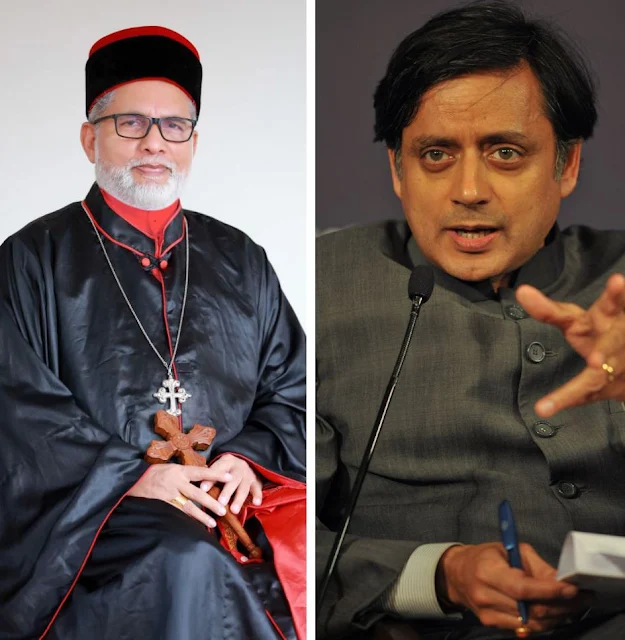Member of Parliament Shashi Tharoor delivered the inaugural Rev Jose Joseph Pulavelil Memorial Lecture at Alphonsa College, Pala, on September 24, 2024. The lecture honoured the memory of a dynamic and popular priest and teacher of English at the college who passed away after a short spell of illness.
The MP was scheduled to arrive at 2.30 pm, by which time the auditorium was packed to capacity with waiting students and some members of the general public. He arrived an hour late, and the audience waited patiently. It’s easy to see why Prime Minister Narendra Modi thinks himself non-biological, when one sees how audiences receive celebrity MPs. There was a buzz of excitement long before Tharoor arrived, and one could sense the gushing admiration of young students.
Tharoor spoke of the ‘Power of language, literature and reading’. His speech dwelt on his own long and formidable engagement with words, which began, he recounted, with sleepless nights as an asthmatic child – all he could do was read, and he read voraciously.
The power of words, he explained, was phenomenal – why else would writers be attacked, silenced? One thought of Gauri Lankesh, for instance, or Salman Rushdie. Words are important because it is through them that we connect with each other. Of all the creatures in the world, only humans tell each other stories.
Tharoor said he had come across young students who had never read for pleasure – whose reading was almost entirely what was demanded of the syllabus. When he was growing up in the 1950s and 1960s, there was no TV and no mobile phone – reading was the one entertainment. Besides the sheer pleasure of reading for its own sake, reading is also a window into the world of another, a life lived vicariously.
Tharoor mentioned that he was once asked if he felt the text belonged to him – as a writer, it is his text, yet it is complete only when the reader makes it his or her own. The MP explained that writers are like channels, that the words and thoughts that are contained in the texts he writes come from beyond, and are channeled through him. Just as what a painter paints may be interpreted quite differently from what the painter consciously painted, so too with stories and words, meanings may be attributed that writers did not intend to convey.
He spoke of writing in English as an Indian, and claimed English as his own language. He dismissed the notion of poet Harish Trivedi, who held that Indians writing in English could not offer the experiential richness of the writers in tongues that originated in the Indian subcontinent. He talked of how, in his writing, he has engaged with being an Indian; his writing could only ever have been produced by an Indian, and in English, he said.
Bishop Joseph Kallarangatt was only a silent presence – seated on the dias for a while, quietly making an exit at some point
Tharoor dwelt in some detail on his own output as a writer, and asserted that just as the British Raj left India the Railways, Telegraph, and a system of law, so too, it brought to India the English language that became India’s. English, he said, helped India find her voice – it was the medium of communication for Indians with a linguistic diversity that prevented easy communication across different language groups.
It is the language that enabled his Kashmiri-Bengali former wife, the mother of his children, to communicate with his mother.
Through language, we see that what we share in common far outweigh the differences; language is what helps us transcend our immediate environment and imagine a different reality. At some points in his speech, the MP appeared almost to quote the Bible, although he did not quite say, “In the beginning was the word”.
There are occasions in public life when silences are noteworthy – at the lecture in Pala town of Kottayam district in Kerala, no one remarked that Bishop Joseph Kallarangatt was only a silent presence – seated on the dias for a while, quietly making an exit at some point. This writer has never once been to a public event that a Bishop attended at a Catholic institution, to remain silent.
Bishop Kallarangatt is not in the ordinary run of Bishops – he attracted much controversy over his “love jihad” comments, which he did not retract when challenged to produce evidence. This journalist has lived in Pala for over two years, within a km of the Bishop’s House. This was the first time she had seen the Bishop in flesh and blood, even though she is a regular church goer.
Bishop Kallarangatt often has long letters sent to all parishes over whom he holds jurisdiction, and these letters often address issues that have little to do with the Bible or Christian belief. He seldom preaches sermons in the churches that he oversees.
Why, one wondered, was the Bishop silent at this event? Was it not an important opportunity to address a Member of Parliament, and speak as a voice of Christians? Why would a Bishop not even rise to lead such a gathering in prayer?
Sometimes, questions are answers.
---
*Freelance journalist


Comments